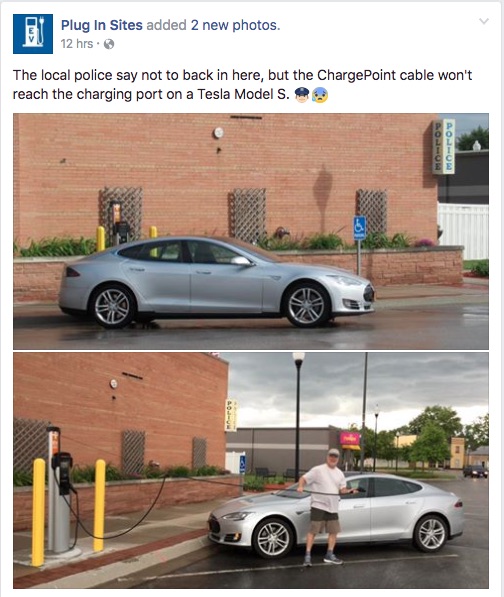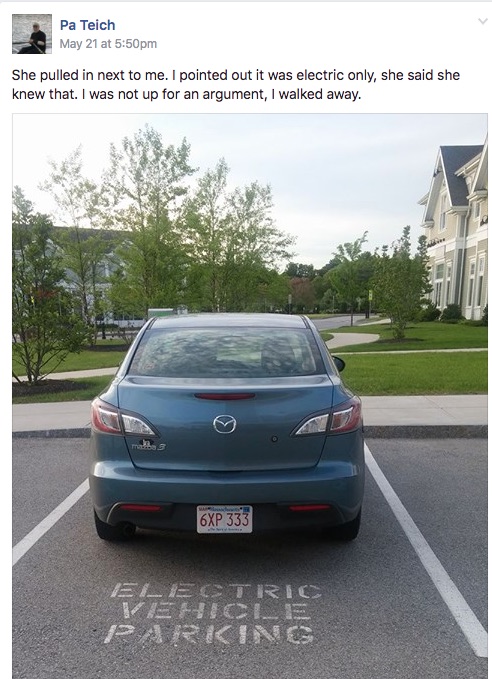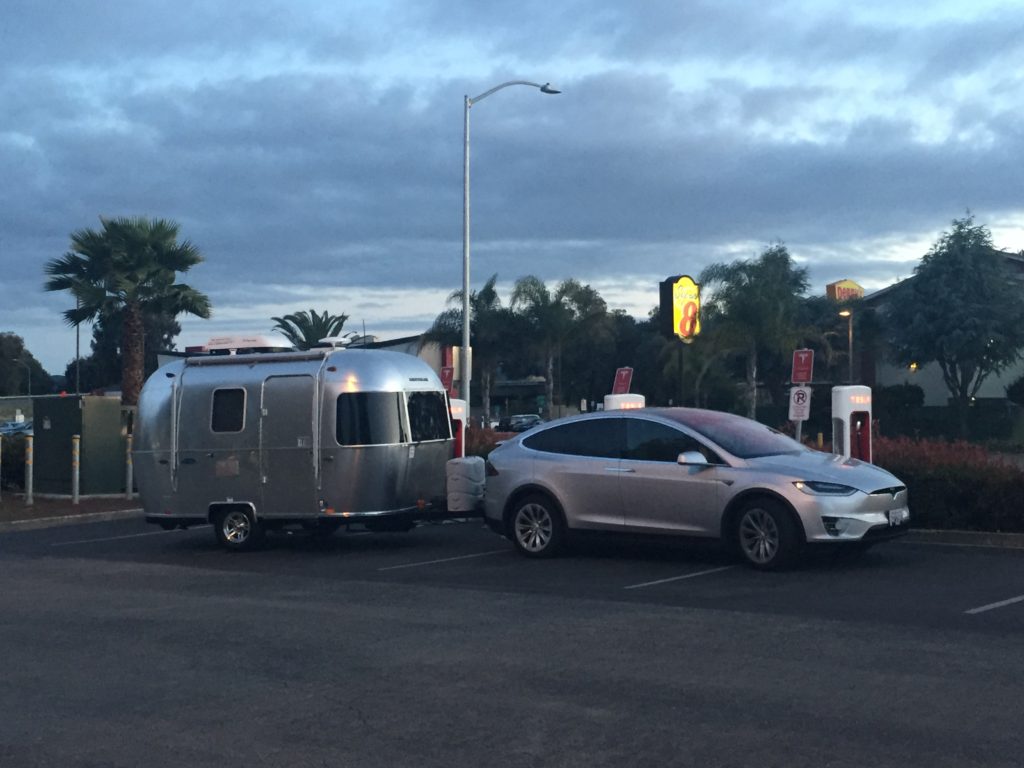Last Update: 2021-01-03T23:53:32.513Z
In Safely use Extension Cords when charging an electric car or electric motorcycle we go over how to safely use an extension cord. On this page we'll discuss WHY.
Poorly laid out charging station
Some electric cars put the charging port in the front, others in the rear. The cars with a rear-mounted charging port more-or-less force the driver to back-in to the charging station, where those with front-mounted charging ports can be parked nose-in. It isn't always possible to back-in to the charging station either because of laws or practicalities.
Charging station positioning is not always optimal.

In this case, parking spaces are at an angle, and when combined with a rear-mounted charging port the charging cord cannot reach.
One can argue that the charging station should have a longer cord. Be that as it may, simply carrying a J1772 extension cord allows the car to be charged.
What if local laws require nose-in parking?
In some localities the law requires cars to be parked with the nose facing the curb. What about the cars with rear-mounted charging ports? Simply following the law can prevent ability to charge, as shown in the previous picture.
Maybe the law should be changed, or maybe the charging station should have a longer cord. Again, a J1772 extension cord would allow charging to occur.
ICE or EV car blocking a charging station
We can teach all we can about charging station etiquette, but the fact is that some people simply refuse to practice common decency. Etiquette lists simply turn off certain types of people, and turn them into rebels asserting themselves against authority. See Charging station etiquette - effectively sharing limited electric car charging resources
It so happens that sometimes car drivers block charging stations. It's either ignorance or rudeness or a political statement. Sometimes it is a car whose charging session is finished, but the car owner hasn't returned to unplug and move the car. Bottom line, it doesn't matter why, an EV driver is unable to charge when its needed.

With a J1772 extension cord you can often park one or two stalls over and still access the blocked charging station.
See these Facebook groups for reports and discussion about both ICE and EV vehicles blocking charging stations:
What to do for a car whose charging session has ended
Does your need to charge your car take precedence over another electric car that's actively charging? That's a debate for another page, so see Charging station etiquette - effectively sharing limited electric car charging resources
It happens sometimes that an electric car will have been charging, finished its charging session, and then has not been moved. It's blocking the charging station, preventing others from charging their car. One thing is to leave a (nice) note on the car explaining points of etiquette. See our Etiquette page for an example note.
If you're certain the charging session has ended, it is always appropriate to unplug the car. Some electric car owners get righteously upset that someone else touched their car. Do they own the charging station? No. The charging station is a public resource and should be treated as such.
Is it okay to unplug a Tesla Model S/X thinking their battery pack is so huge there is no way in heck they actually need to charge? No. It's impossible to know the other persons status and what they truly need. They may have to go 600 miles before nightfall and got into a situation and this was the only charging station they could find. In other words, there might be a legitimate need.
Temporary parking situations preventing normal use
Sometimes temporary situations crop up that block normal access to a charging station. For example the charging station might be next to a loading/unloading area for a supermarket, and a delivery truck might temporarily block access. Or a special event might cause a TV camera truck to block the charging station. At home you might have a situation putting stuff in the driveway making it impossible for the charging cord to reach the electric car in its new parking space.
Again, a J1772 extension cord will help you through such situations.
Electric car extension cords won't solve every case

A J1772 extension cord will not help you charge at a DC Fast Charging station. CHAdeMO nor CCS nor Supercharger extension cords exist, for good technical reasons. A blocked DC fast charging station will simply prevent you from charging your car.
No extension cord will solve for mismatched charging ports. For a CHAdeMO car to charge at CCS, or any other combination, requires a charging adapter. See Fast charge adapters are possible, but how many really need CHAdeMO-CCS adapters?
Even in cases you can use an extension cord, it won't always reach. For example the neighboring spots might be handicapped parking, and you would compound the situation by breaking the handicapped parking laws.



